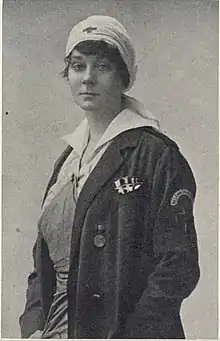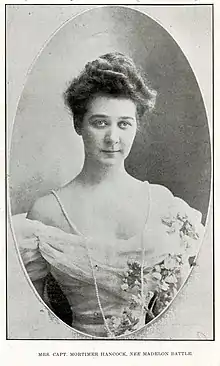Madelon Battle Hancock
Madelon Battle Hancock, Comtesse de Hellencourt (born Madelon Belknap Battle; August 30, 1881 – September 29, 1930) was an American socialite and nurse. She worked in hospitals in Belgium throughout the First World War, receiving the nicknames "Glory Hancock" and "Most Decorated Woman of World War One". She was the recipient of various British, French, and Belgian honors for her service during the war, including the Order of the Crown, the Croix de guerre, and the British War Medal. She was ennobled by Albert I of Belgium.
Madelon Battle Hancock | |
|---|---|
 Hancock in her nurse's uniform c. 1915 | |
| Born | Madelon Belknap Battle August 30, 1881 |
| Died | September 29, 1930 (aged 49) Nice, France |
| Other names |
|
| Education | Saint Mary's School Presbyterian Hospital School of Nursing |
| Occupation | Nurse |
| Spouse |
Mortimer Hancock
(m. 1904; div. 1923) |
| Children | 1 |
Early life
Battle was born in 1881 the daughter of in Dr S Westray Battle and Alice Maud Battle née Belknap. Battle was born in Pensacola, Florida, where her father was in charge of the US Naval Hospital, but the family moved to Asheville, North Carolina, in 1884 after Dr Battle left the navy.

Battle went to Saint Mary's school in Raleigh.[1] After graduating high school in 1889, Battle became something of a socialite and North Carolina newspapers often commentated on her activities. In 1902 she enrolled at Presbyterian Hospital School of Nursing in New York City but left before completing her training.[2][lower-alpha 1]
In 1903 many newspapers carried a story that Battle had become engaged to a British landowner, Cecil Graham. The story was emphatically denied by Battle's family as "absolutely false".[4]
In 1904 she married British army officer, Mortimer Hancock, at a ceremony that The Atlanta Constitution described as "the most distinguished wedding celebrated in North Carolina for a number of years".[5] After her marriage she moved to England and India with her husband. They had one son, Westray Battle Hancock, born 1907.
World War One
At the outbreak of the war the Hancocks were living in England and was determined to volunteer as a nurse in Belgium.[6] She travelled to Antwerp to work with a British hospital unit in the city and remained with the hospital through the siege of the city until the hospital was evacuated in October 1914.[7] After a brief period with American Red Cross Hospital No. 1 (aka American Ambulance) in Neuilly,[8] Hancock returned to serve with a hospital nearer the front lines. For the next four years she worked almost ceaselessly in front-line hospitals and her activities and letters home were often reported in American newspapers, an opportunity Hancock used to ask for relief funds.[9] Her plea was answered and many gifts sent including a consignment of 60,000 packets of cigarettes donated by Asheville Fire Department.[10]
In June 1918 Hancock took a period of leave and returned to the United States for two weeks to visit her family accompanied by her pet monkey, Belladonna.[11] After her leave Hancock returned to the Western Front and continued nursing until the end of the war.[12] Very early in the war she was given the nickname "Glory Hancock" by the British troops and the name appeared in the press as early as October 1914.[13]
Decorations
Hancock was decorated by Belgium, France and Great Britain. The decorations included:[14]
- Order of the Crown (Belgium)
- Civic Decoration (Belgium)
- Croix de guerre (Belgium)
- Queen Elisabeth Medal (Belgium)
- Yser Medal (Belgium)
- Commemorative Medal of the 1914–1918 War (Belgium)
- Croix de guerre (France)
- 1914 Star (Great Britain)
- War Medal (Great Britain)
- Inter-Allied Victory Medal (Great Britain)
Later life
After the war Hancock spent time in Asheville recovering before rejoining her husband. The strains and separation of the war took their toll on the couple and they divorced in 1923.[12] In 1928 Hancock formally changed her name to Madelon Hellencourt and used the title Countess de Hellencourt, a title received with the award of the Belgian Order of the Crown.[15][16]
Hancock died in Nice, France, on September 29, 1930, after surgery.[17]
References
Notes
- Some sources say she completed her training in 1905 but the archives of the School of Nursing show that her diploma was only awarded in 1917 as an honorary award.[3]
Sources
- "Madelon "Glory" Battle Hancock Most decorated nurse in WWI". North Carolina Nursing History. Appalachian State University. 2021.
- "Around Town". The Asheville Citizen. Vol. 18, no. 39. July 15, 1902. p. 4 – via newspapers.com.
- "Madelon Battle 1905" (PDF). The Alumni Magazine. Vol. 107, no. 1. Columbia University-Presbyterian Hospital School of Nursing Alumni Association. Summer 2014. p. 25.
- "News faker fakes". Knoxville Sentinel. Vol. 17, no. 25. January 29, 1903. p. 2 – via newspapers.com.
- "Hancock-Battle". The Atlanta Constitution. Vol. 37, no. 20. July 5, 1904. p. 8 – via newspapers.com.
- Van Vorst, Marie (1916). War letters of an American woman. John Lane. p. 50.
- Klewkowski, Ed & Klewkowski, Libby (2018). Edith Wharton and Mary Roberts Rinehart at the Western Front, 1915. McFarland. pp. 44–45. ISBN 978-1476667461.
- Van Vorst, Marie (1916). War Letters of an American Woman. New York: John Lane. p. 123.
- "Plea made for aid for the Belgians". Asheville Citizen. Vol. 32, no. 92. January 23, 1915. p. 12 – via newspapers.com.
- "Asheville cigarets reach the trenches". Asheville Citizen. Vol. 32, no. 224. June 3, 1916. p. 3 – via newspapers.com.
- "Pet monkey a real mascot for "Sister Glory Hancock". Nurse under fire at front". The Evening World. June 19, 1918. p. 14 – via newspapers.com.
- Pollitt, Phoebe. "Madelon "Glory" Battle Hancock — Heroine of World War I" (PDF). Tar Heel Nurse. No. Summer 2017. North Carolina Nurses Association. p. 14.
- "News from Mrs "Glory" Hancock". Asheville Gazette-News. Vol. 19, no. 222. October 27, 1914. p. 6 – via newspapers.com.
- "Edgecombe women is most decorated in all the world". The Daily Southerner. Vol. 40, no. 20. April 8, 1920. p. 1 – via newspapers.com.
- "No. 33350". The London Gazette. January 24, 1928. p. 573.
- "Devoted nurse taken by death". Asheville Citizen. October 1, 1930. p. 16 – via newspapers.com.
- "Mrs. de Hellencourt succumbs in France". The News & Observer. Vol. 132, no. 93. October 1, 1930. p. 2 – via newspapers.com.